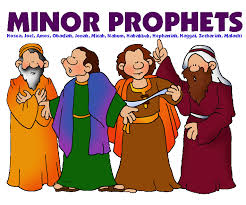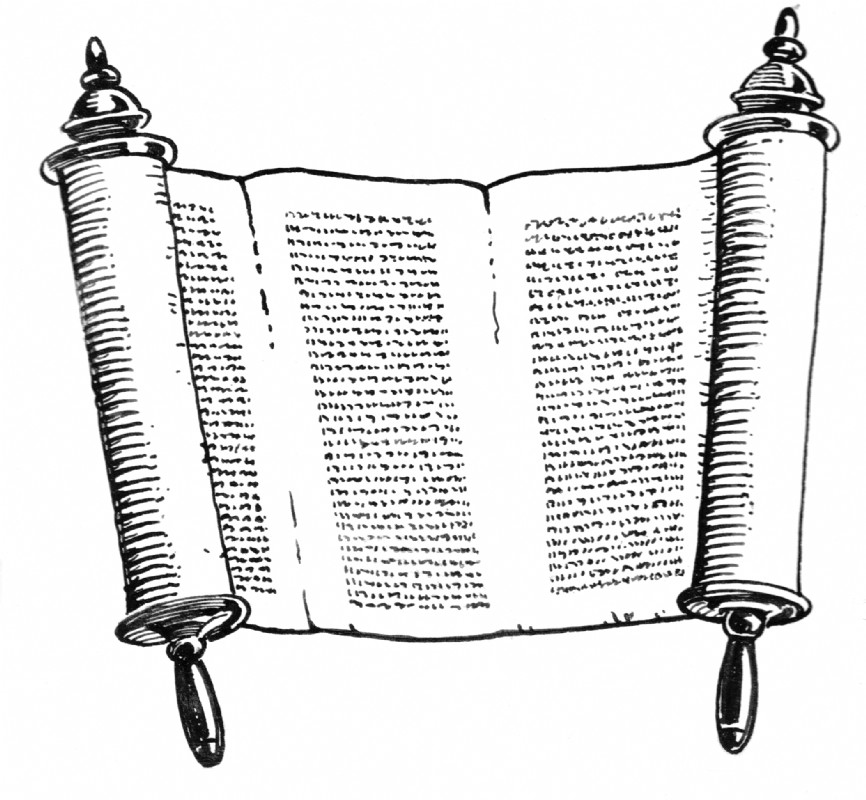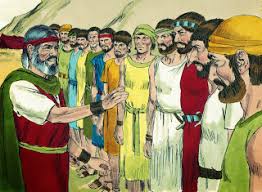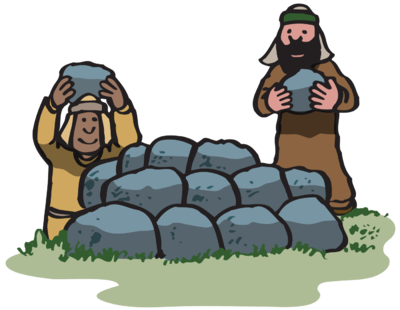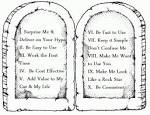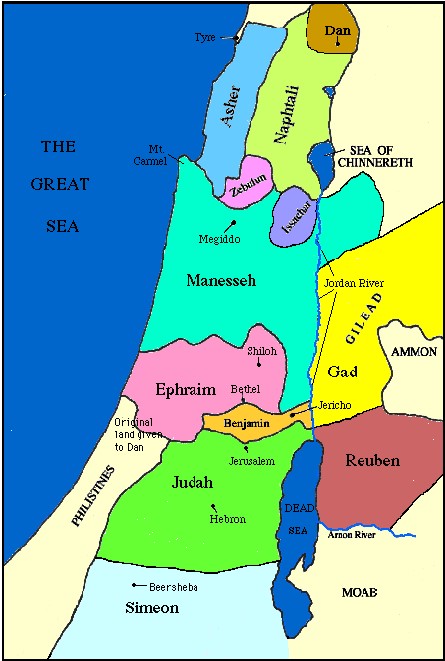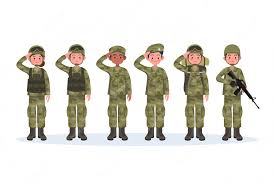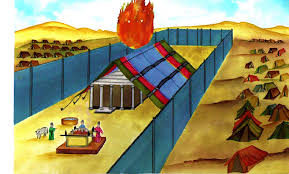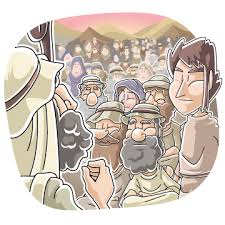Zechariah 1:7 – On the twenty-fourth day of the eleventh month, which is the month of Shebat, in the second year of Darius, the word of the Lord came to the prophet Zechariah, the son of Berechiah, son of Iddo, saying,
If you haven't read the book of Haggai recently, it would be beneficial for you to take a few minutes and do so now. With only two chapters, you can finish it quickly.

The reason you might want to stop and do so, is because the ministries of Zechariah and Haggai overlap. Because God used both of them to speak to the same groups of people during the same generation, your study of Zechariah will be enhanced if you are at least familiar with the work of Haggai.
As far as the Jews were concerned, the messages of Haggai and Zechariah were a two-witness confirmation that God was moving in their midst (II Corinthians 13:1, Deuteronomy 19:15). That must have been a real blessing and encouragement to them, as they were experiencing long and arduous trials, which seemed like they would never end.
Because Haggai and Zechariah exactly date some of their material, we can form a general timeline of events.
516 BC, the sixth month: Through the prophet Haggai, God commanded the Jews to finish rebuilding the temple. (They had abandoned this task due to intense opposition.) Haggai also discloses that for the last few years God prevented his people from prospering because they had abandoned this work (Haggai chapter 1).
Based on the word of the Lord through Haggai, the Jews obediently returned to building the temple.
516 BC, the eighth month: Zechariah gives his first prophesy (Zechariah 1:1-6). As we studied in our last post, God commanded his people to carefully consider the ways of their ancestors, so they could avoid making the same mistakes and receiving the same punishments. God invites the Jews to return to him and be blessed (Zechariah 1:3).
516 BC, the ninth month: Haggai receives and reports the revelation he received in Haggai 2:10-23.

516 BC, the eleventh month: Haggai prophesies that God is going to shake the heavens and the earth; he is going to overthrow/punish Gentile nations. He will use the current generation of Israelites like a signet ring to seal his word and promises to future generations. He will glorify Israel in the future (Haggai 2:20-23).
516 BC, the eleventh month: Zechariah has a series of visions, one following another all in the same night.
These visions all follow the same basic pattern – the vision is given, a question is asked which prompts additional information to be shared about the prophetic word, and then an angel gives the interpretation of the vision (more on that shortly).
The visions are distinct and separate, yet when taken together, they give a roadmap of God's future plans for his people. Regardless of Israel's past mistakes and current lowly condition, God's purposes for them remained unchanged. God was determined to do good to his people; he would make sure that Israel fulfilled the destiny he had in store for her.
These future plans and words of encouragement were a source of great comfort and inspiration to people who were just emerging from a period of God's discipline.
Zechariah 1:8 – "I saw in the night, and behold, a man riding on a red horse! He was standing among the myrtle trees in the glen, and behind him were red, sorrel, and white horses."
The first thing to notice is that even though it is night time, Zechariah is having a vision, not a dream.

A dream is a thought/idea or series of thoughts/ideas which occupy your mind during sleep. Dreams can be of divine origin, demonic origin or neither (i.e., the result of your own subconscious thoughts, which originate in your soul). They must be interpreted after you wake up. A good scriptural example would be the dreams that King Nebuchadnezzar saw (and Daniel interpreted) in Daniel chapter two.
Visions are more like a picture (or sometimes a movie), which you perceive when you are awake. During a vision, your physical eyes can either be open or shut. It really doesn't matter, because you are essentially using your spiritual eyes to see into the spiritual realm through the use of your mind or imagination.
For example, in Acts 9:10-17, Ananias had a vision from the Lord in which he was instructed to go lay his hands on Saul and pray for him to receive his sight. In Acts 10:9-16, Peter had a vision of a sheet filled with unclean animals which he was instructed to eat.
God spoke to Zechariah through a vision, but that is not his only method of communication. He also speaks through dreams, his word, or impressions upon your heart/mind. Sometimes he sends messages to us through angels. He even communicates with us through art, music or nature.
The important thing to know is that God does not limit his communication to religious leaders or prophets. He speaks to all Christians:
John 10:27 - My sheep hear my voice, and I know them, and they follow me:
Let me repeat that: If you are a Christian, God is speaking to YOU. It is up to you to train your eyes and ears so you can see/hear him. If you need further instructions, there are many good resources available which will teach you how to do just that.
Zechariah saw his vision during the night. Is there any significance to that?
Not necessarily. 'Nighttime' may simply have been the time he set aside each day to meditate on the law. Or maybe it was the only time he was by himself and able to fully pay attention to the vision.
However, there are some commentators who think the darkness was reflective of the current state of Israel – the light of the nation was dim compared to her former power and glory.
Other scholars believe the darkness shows that Israel's current understanding of God's future plans was dim or dark, but the visions of Zechariah gave them glimpses of the future when God would bring his plans to full light.
Yet another theory says that the darkness was emblematic of the affliction under which the Jews groaned.
Regardless of whether the timing was significant or not, we know that Zechariah sees the following:
A man riding on a red horse: This man is clearly the leader of the host who follows behind him. As we will see, the others report to him and he instructs the angel, who then communicates with Zechariah.
Two main theories have been given as to the identity of the man on the red horse.
One theory claims it is an angel in the form of a man. Those who hold to this theory believe it may be the angel Gabriel who also appeared to Daniel (Daniel 9:21), Zechariah (Luke 1:19) and Mary (Luke 1:26-27).

Another, more widely accepted view, says that the man on the red horse is a theophany – a manifestation or incarnation of Jesus which occurred before he was born on earth.
For example, many believe that it was Jesus who appeared to Joshua just before the conquest of the Promised Land (Joshua 5:13-15). In this account, the 'man' instructed Joshua to remove his shoes because he was standing on holy ground. He also accepted worship from Joshua. He identified himself as the captain of the Lord's army, which certainly corresponds to the role of Jesus. We find similar appearances of Christ in Daniel 7:13-14, Daniel 10:5-6 and Exodus 3:2.
Those who believe the rider of the red horse was Jesus point out to the following facts:
- The rider cries out to God, advocating for the Jews; Jesus is the advocate of the saints.
- The rider speaks good and comforting words to the Jews; Jesus speaks comforting words to Christians.
- The rider comes swiftly to the aid of his followers; Jesus comes swiftly to the aid of the church.
In addition, at that time in history, common people rode donkeys. Riding a horse was a sign of majesty and glory which was reserved for kings or generals (Psalms 45:4).
For the purposes of our study, we will assume the rider on the red horse was Jesus.
His horse is red, which is often used as an emblem of war and bloodshed (Revelation 6:4). In this particular vision, the red horse may symbolize the vengeance of God that will be visited upon the enemies of the Jews (see verse 15).
Standing among the myrtle trees in the glen: Here is some information you might find helpful: Not every detail of a vision, prophesy, or parable has a corresponding element in its interpretation. In this case, the myrtle trees have no real significance. They are present because they would be a natural part of an outdoor scene that involved men on horseback, who were traveling throughout the land.
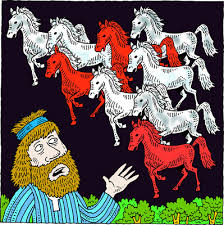
Behind him were red, sorrel and white horses: The riders of these horses are universally recognized as angels. Angelic forces are known to be organized much like human military units. They have different branches, ranks, levels of authority and areas of expertise. For this reason, the different colors of the horses are thought to represent different ranks of angels who were under the command of Christ.
Zechariah 1:9 – "Then I said, 'What are these, my Lord?' The angel who talked with me said to me, 'I will show you what they are.'"
If you don't fully understand the vision at this point you're in good company – Zechariah doesn't understand it either. When has asks for clarification, God sends a ministering angel to assist him (Hebrews 1:14).
This angel is distinct from the beings seen in the actual vision. His job was to present the visions to Zechariah's mind/imagination and then to function as a guide and interpreter who would assist Zechariah in understanding the things he was shown. For ease and clarity, we refer to him as the 'assisting angel' from now on.
Zechariah 1:10-11 – "So the man who was standing among the myrtle trees answered, 'These are they whom the Lord has sent to patrol the earth.' And they answered the angel of the Lord who was standing among the myrtle trees, and said, 'We have patrolled the earth, and behold, all the earth remains at rest.'"
In response to Zechariah's question, the assisting angel turns to the leader on the red horse (Jesus) who provides the answer to his question. This demonstrates that all information given to Zechariah by the assisting angel comes from Jesus. This will be true in all of the visions.
Jesus says that the angels on the horses patrol the whole earth (not just Israel), taking note of the affairs of mankind.
No mention is made of these angels executing judgment on God's behalf or of them rescuing people. This leads to the conclusion that the orders of these specific angels are limited to inspection and reporting. They either report to a higher angel or directly to the Lord.
Was this a temporary assignment or a permanent one? Although we have limited information from the vision, we get the distinct impression from the context that this was a permanent duty for this particular subset of angels.
But I also want to point out that God does send other angels on unceasing errands to counter Satan's plans and to defend and rescue his people:
Psalms 34:7 – The angel of the Lord encamps around those who fear him, and delivers them.
(See also Psalms 91:11, Psalms 103:20-21, etc).

Now, at this point, we need to stop and clarify something.
God is omniscient. This means that he knows absolutely everything. He is aware of all the events, decisions, thoughts, and actions of every individual person as well as every nation in the world, at every moment in time (Psalms 139:1-4). In fact, he even knows what will happen before it actually occurs (Isaiah 46:9-10). Therefore, God has no real need for angels to patrol the earth and report their findings back to him.
Since that is the case, what is the purpose of the angels in the vision?
The vision is to give comfort and encouragement to the Jews. God condescended to the level of his people to teach them/give them a picture of his love and care for them. Let me explain.
From Israel's perspective, things are not good. In fact, the situation is depressing. The nation experienced the wrath of God and was sent into exile. Even though God had opened the door for them to return to Jerusalem, they face opposition from the Samaritans and Gentiles at every turn. Construction on the temple had only recently begun again and the walls/gates of Jerusalem were still in shambles.
The people were poor, discouraged and tired. No doubt, they often wondered if God took any notice of them at all. Furthermore, they questioned that if God did see them, why wasn't he doing anything? Why were their enemies at rest when they were constantly under duress?
So, the picture of numerous angelic hosts patrolling the earth and reporting to God is a simple yet concrete way for the Jews to understand that God is always watching.
He is taking note of every event that happens. He is well aware of the trouble that other nations/people are giving the Jews, and at the proper time, he will move into action.
Have you ever experienced a time when you wondered if God saw you or your situation? If so, remember the vision of the angels and be reassured that God is keeping a close watch on you, just as he did the Jews of Zechariah's day.
The angels on horseback confirm that they have indeed traveled through the world, as instructed. Their investigations reveal that all the nations of the earth are at rest or peace. In other words, there is an absence of war and calamity on the earth. History confirms that this was true in the second year of the reign of Darius.
This rest contrasted with the unrest and hardships being experienced by the Jews who had returned to Jerusalem. Although rest had been promised to them, they were not yet experiencing it. The walls/gates of Jerusalem were still broken down (Nehemiah 1:3, 2:3), and work on the temple had only recently started again. There was a lot of work to be done, and the Samaritans and Gentiles were still actively opposing them at every turn.
But the vision indicates that their present distress will not last forever. God was not asleep on his throne; at the appointed time he would step in and punish those who abused the Jews.
Zechariah 1:12 – "Then the angel of the Lord said, 'O Lord of hosts, how long will you have no mercy on Jerusalem and the cities of Judah, against which you have been angry these seventy years?'"
Again, the Angel of the Lord is the one who rides a red horse and stands as leader among the myrtle trees. This is none other than Jesus, the Son of God, the Lamb slain from the foundation of the world (Revelation 13:8) and the only Mediator between God and man (I Timothy 2:5).
The vision portrays the passionate and fervent intercession of Jesus as he calls out to his Father (the Lord of Hosts). There can be no doubt that Jesus sees and is affected by their afflictions. His intensity demonstrates the level of compassion he has for his people. He cries out for both their temporal and spiritual good.

The phrase 'how long will you have no mercy' is not a complaint; it is the heartfelt request of one who has been touched by our infirmities and is longing for mercy (Psalms 13:1-2, Revelation 6:10).
The stated term of 70 years is a bit tricky to understand. We know that the period of the Babylonian captivity was 70 years, but this cannot be the seventy years mentioned here, because that time period was well past. By the time Zechariah saw this vision the Jews had been back in Jerusalem for 18 years.
What 70-year time period is mentioned here? Rather than referring to the period of captivity, it seems to refer to refer to the period when there was no temple and thus no place of fellowship between God and his children.
The destruction of Solomon's temple occurred at the same time King Zedekiah was removed from Jerusalem to Babylon (roughly 588 BC; see Jeremiah 52:9-13). At the time of this vision (516 BC), it was in the process of being rebuilt, so this was likely the period in question.
The focus or point of this question is the lack of fellowship between God and man.
Zechariah 1:13 – And the Lord answered gracious and comforting words to the angel who talked with me.
In response to the prayer/petition for mercy, Jesus gave the angel (and Zechariah) words of comfort and consolation. These were reassurances from God that his anger towards Israel was appeased and he would soon bring to pass all the promises that he had made to her. Because of his great love and compassion for Israel, he would once again bestow his favor and blessings upon the nation (Isaiah 57:16-19).
This ties in with a word given much earlier by the prophet Isaiah:
Isaiah 40:1-2 - Comfort you, comfort you my people, says your God. Speak tenderly to Jerusalem, and cry unto her, that her warfare is accomplished, that her iniquity is pardoned: for she has received of the LORD's hand double for all her sins.
Zechariah 1:14 – So the angel who talked with me said to me, "Cry out, 'Thus says the Lord of hosts: I am exceedingly jealous for Jerusalem and for Zion.'"
The assisting angel instructs Zechariah to 'cry out'. In other words, the vision was not just for his edification or comfort. He was to proclaim this good news to the entire nation.
Specifically, he was to inform the people that God was 'exceedingly jealous for Jerusalem'. What does that mean?
This is an expression that clearly declares the boundless love of God for his people. Because it is difficult, if not impossible, for us truly to understand the depth of God's love toward us, God often uses an analogy to express it. Sometimes he likens himself to a husband, with the Jews (or the church) as his wife. Other times he expresses his love in terms of the relationship of a Father to his children.
In both/either case, God is showing that he is, was and will continue be utterly devoted to/in love with his people. He is fully and zealously committed to blessing his people, showering them with favor and leading them to the incredible destiny he has prepared for them.
In addition, he has a strong feeling of indignation against their enemies.
Now let's stop and consider the outlook of the Jews for a minute. Although they had returned from captivity, they were not experiencing the joy, rest or favor of God. Because of this, they doubted his love for them. They felt like God was neglecting them or that he was indifferent and unconcerned about their struggles.
But they were wrong. The Lord of Hosts (the God with infinite power and resources) was like a jealous husband or father, who was getting ready to wage war on anyone who harmed his loved ones.
Zechariah 1:15 – 'And I am exceedingly angry with the nations that are at ease; for while I was angry but a little, they furthered the disaster.'
There is no doubt that God had disciplined his people for their idolatry by sending them into captivity. Much like a loving Father, it probably broke God's heart to do so, but he had to correct his people for their own benefit.
Proverbs 3:12 - For whom the LORD loves he corrects; even as a father the son in whom he delights.
There is also no doubt that God used the Gentile nations of the world as his method of punishment; it was the Assyrians and the Babylonians who took Israel into captivity.
 But while God's intent was correction through punishment, the Gentile nations were bent upon the total destruction of the Jews.
But while God's intent was correction through punishment, the Gentile nations were bent upon the total destruction of the Jews.As the Gentiles of the world were enjoying a period of prosperity and peace (no wars or national calamities), they not only turned a blind eye to the suffering and hardships of God's people, they continued to cruelly abuse and oppress them, multiplying their misery and distress.
God wants his people to know that he sees the injustice being done to them, and it has aroused his jealous anger.
Zechariah 1:16 – Therefore, thus says the Lord, 'I have returned to Jerusalem with mercy; my house shall be built in it, declares the Lord of hosts, and the measuring line shall be stretched out over Jerusalem.'
God now announces the action he is going to take. He gives the Jews a message of hope, pardon and reconciliation. Their punishment is over; they have been pardoned.
The proof of his favor and presence among them was that the temple (the place of fellowship between God and man) was going to be rebuilt. Once again, divine worship would be restored. Once again, people would celebrate the festivals. Once again they would honor God with sacrifices/offerings.
Sure enough, this came to pass just as God said. We know the foundations of the temple had been laid many years earlier, and that work had ceased until the call of Haggai in the second year of Darius (Haggai 2:18, Zechariah 1:1). It is also good to know that the temple was finally completed in the sixth year of Darius (Ezra 6:15).
Thus, God was giving his people hope and encouragement through this vision. Their current condition was not going to last forever; therefore they should rejoice as they set about the work before them. They had good reason to look to the future with hope and expectancy, because God had returned to Jerusalem!
God also declares that he will stretch a measuring line over Jerusalem. What does that mean? Today, carpenters use a tool called a tape measure. They use this device to take measurements while building. The measuring line mentioned here is used in the same context; it speaks of God ensuring the rebuilding not only of the temple, but also the walls, gates, streets and houses of Jerusalem.
The rebuilding would not be haphazard, but methodical and full of purpose. The buildings would have both beauty and strength due to the skill and artistic ability of the people. God had a plan and he was bringing it to pass!
Zechariah 1:17 – 'Cry out again, Thus says the Lord of hosts: My cities shall again overflow with prosperity, and the Lord will again comfort Zion and again choose Jerusalem.'
The phrase 'cry out again' indicates that a further promise is being made.
Not only will Jerusalem be rebuilt, it (and the other cities of Judah) would again overflow with good (earthly prosperity and happiness as well as spiritual blessings). This would be an indication that God had chosen or favored the city of Jerusalem and his people.
According to John Calvin in his Old Testament commentary, the original phrase translated 'overflow with prosperity' actually means 'to wear out through abundance of blessings'.
The implication is that all the ruined cities of Judah would not just be restored, they would increase and spread out with an explosion of population. Furthermore, such an enormous volume/amount of blessings will be placed upon them, that they will be crushed or squeezed by the weight of them; they would not be able to contain them.

This overflow of good things would be a sign that God's favor had returned to them; his goodness and love again rested upon his people.
From the perspective of the Jews back in Zechariah's day, this was an astonishing promise. It was hard enough to believe that the temple and the city would be rebuilt; the level of prosperity that God promised was too much to comprehend. Such a thing could only be accomplished by the Lord of Hosts.
This promise was a further word of encouragement and strength to the people who had grown weary in their work. It spurred them into action and soon produced the blessings God described. We know that the Jews began to prosper once again under the leadership of Nehemiah and Zerubbabel.
And of course, they were always spiritually blessed. The culmination of that blessing occurred when Jesus the Messiah was born into their midst to deliver the gospel of salvation, which overflowed Jerusalem into Judea and unto the uttermost parts of the world. Hallelujah!
We expect the vision to be fulfilled once again in the future, when Israel finally recognizes Jesus as Messiah and the Jews will be converted. This will be the final proof that God has chosen them and not cast them off or rejected them.
Now that we have taken the time to examine the first vision of Zechariah, it's time to ask ourselves a question: Could this vision have a fulfillment in our generation?
What do you think? I believe the answer is 'yes'.
Much like ancient Israel, the church in America has been unfaithful to God especially in the last 50 years. Our love for him has grown cold. We legalized the killing of innocent children (abortion), kicked God out of the public arena (including our schools and government), and set about serving our own interests (money, pleasure, etc).
Because of that, we find our nation in a current state of crisis. Chaos is everywhere. Our government is out of control, our economy is in danger of failing, the police cannot maintain law and order, and the courts no longer provide justice.
More and more, the church is being oppressed by unbelievers. They actively oppose us as we try to take back the nation which was established under God. At the same time, we seem to be powerless and ineffective in promoting God and stemming the current tide of evil. It would be easy to slip into a state of despair and cease to do the work of the Lord.
But, like ancient Israel, God has not cast us off! Jesus intercedes on our behalf before the Father, who jealously loves us.
Romans 8:34 - Who is he that condemns? It is Christ that died, yea rather, that is risen again, who is even at the right hand of God, who also makes intercession for us.
Hebrews 7:25 - Therefore he [Jesus] is able also to save them to the uttermost that come unto God by him, seeing he ever lives to make intercession for them.
Although it is hard to see any change yet, God has spoken through his modern day prophets to assure his church that he has seen our repentance and he is going to heal our land (II Chronicles 7:14). He will cause us to succeed in our destiny – to preach the gospel to the ends of the earth.

As we continue to repent and pray, God is going to send a mighty revival to America. The church will not only be restored, it will multiply and overflow with a new population (harvest) of believers.
Just like ancient Israel, Christians can expect the blessings of God (both temporal and spiritual) to be poured out upon us. We will then use these blessings to harvest even more souls for the kingdom.
Although this may seem impossible at the moment, let us receive these words of faith and act accordingly; let us renew our commitment to the work of building God's house (the church) just as ancient Israel did!
In closing, let me encourage you to reread the information about the vision and see what parallels you can find between Israel and America. There are a few more that I did not take the time to mention, but I bet you can find them on your own.
Let me offer you some encouragement:
We all have times when it seems as if the heavens are closed and God isn't opening them up to us any time soon. But as we saw in Zechariah's vision, that is not the truth.
During those times when we don't see him moving in our situation, we must live in faith. We must stand on the truth of his promises and reject the lies that Satan speaks through our circumstances.
We can take comfort in Zechariah's vision because it proves that God sees us and loves us; it reveals that he is busy behind the scenes working all things out for our good!
Let me offer you some relief:
The Israelites made their share of mistakes. So have we. But like Israel, we can't let those mistakes define us or ruin our future. If we repent and return to the Lord, we can rest assured that he will draw near to us with open arms. He is able to give us beauty for ashes, joy for mourning and a spirit of praise instead of a spirit of heaviness (Isaiah 61:3).
This is also true for our nation. We have sinned greatly in the sight of God, but we cannot let those past mistakes ruin the destiny that God has planned for America.
Holy Spirit is calling believers everywhere to repent in response to our national sins and to pray for revival. Let's continue to heed this call and watch as God restores and blesses our nation once again.
Let me offer you some strength:
Life for the Jews of Zechariah's time was not a bed of roses. It was a time of warfare and hardship. But through that struggle, they got to witness the rebirth of the temple and their nation. In the end, I bet they thought their struggles were worth it, because they had something worthwhile to pass on to the next generation.
I believe the same is true for the church today. It will take spiritual (and fleshly) warfare in order to get America back on the path of righteousness. We may be called to struggle or bear hardships. But if we will answer the call, God will bless us immeasurably. Plus, we will have the pleasure of knowing that we have something worthwhile to pass on to our children and grandchildren. Isn't that worth fighting for?










